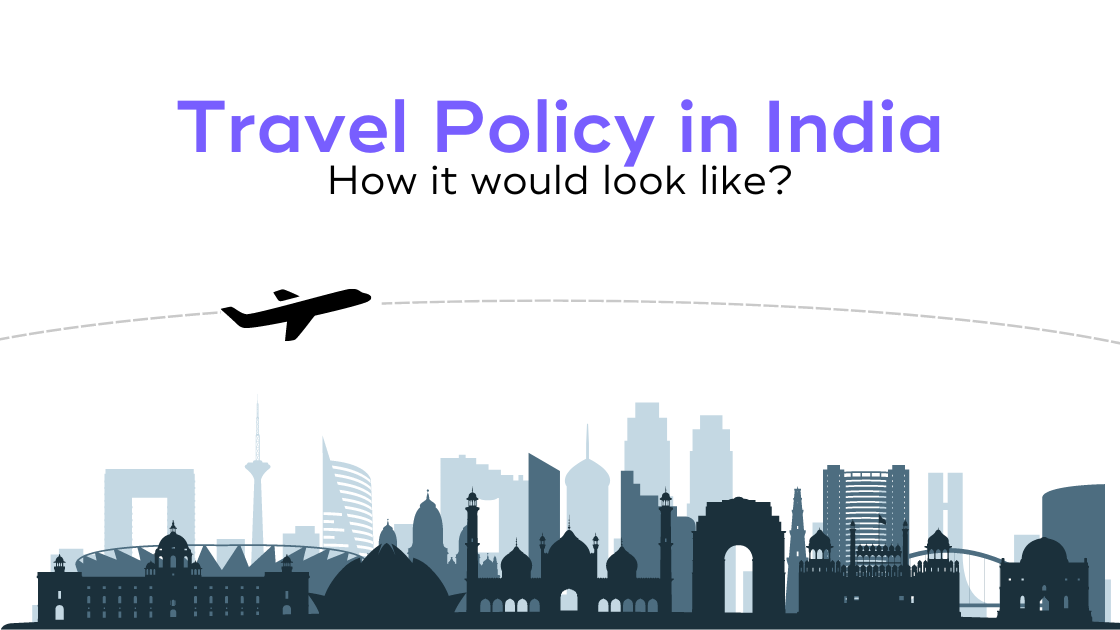Every year, every employee probably goes on some sort of business trip, whether it’s a regular meeting or a key industry conference. Managing these trips can be tough, and it gets even harder if your company doesn’t have a travel policy in India. Having a clear policy can make a big difference in how smoothly everything runs.
So, how does a travel policy look in the corporate world of India? You might be wondering about the details like GST implications, reimbursement limits, TDS, and other guidelines.
Creating a travel policy involves input from several departments. The Legal team drafts the policy, often with help from the Travel Manager. Meanwhile, HR ensures everyone follows the policy and keeps employees informed, also working closely with the Travel Manager.
As you can see, the Travel Manager plays a key role throughout this process. This blog will guide you through how to create an effective travel policy for your company, covering all the essential aspects in detail.
Are you handling travel for your company? This blog will present easy tips on creating a travel policy that works for you.
Let’s start with defining “what is an Employee Travel Policy”?
What is an Employee Travel Policy?
An Employee Travel Policy in India is a set of rules that governs how employees travel for work. It covers everything from booking flights and choosing hotels to getting reimbursed for expenses.
Employee Travel Policy is like a guidebook that answers key questions about work-related travel.
Here’s what it covers:
- Who Can Travel: It tells you which employees are eligible to travel for business purposes.
- Purpose of Travel: It explains what types of business trips are approved.
- Travel Limits and Privileges: It outlines what different departments or roles are allowed in terms of travel limits and benefits.
- Hotel Choices: It specifies what kinds of hotels are acceptable for booking.
- Flight Options: It describes the types of flights you should book for your business trips.
Basically this detailed document covers all the nitty-gritty details you need to know to manage and understand employee travel.
What is the purpose for a travel policy?
The goal of a travel policy is twofold: saving costs and managing travel efficiently.
Saving Costs: A travel policy helps you control spending by setting clear guidelines on how much can be spent on things like flights, hotels, and meals. It often includes rules for booking with preferred vendors who offer better rates. By following these guidelines, you avoid overspending and make sure every dollar is well spent.
Managing Travel Efficiently: The policy also ensures that travel arrangements are handled smoothly. It provides a clear set of rules and procedures for booking travel, reporting expenses, and handling any issues that arise. This means there’s less confusion about what’s allowed, reducing mistakes and making the process easier for everyone involved.
Therefore, a good travel policy acts like a detailed roadmap. It guides everyone in your company on how to travel smartly and stay organized, ensuring trips are cost-effective and run without hitches.
What should you include in a corporate travel policy?
When creating a corporate travel policy for employees in India, make sure it includes the following key points:
Expense Policy: Your travel policy should detail the expenses you will cover for your employees. This includes business-related expenses like travel, meals, and entertainment. It should be clear if you will only reimburse business expenses or if personal expenses will be covered as well.
Reimbursement Process: Clearly communicate the reimbursement process to your employees. Let them know what documents they need to provide and the timeline for reimbursement. This will help them be prepared and know when to expect their expenses to be paid.
Approved Travel Agency or Vendors: Inform your employees about your preferred vendors for travel bookings, travel insurance, hotel rooms, and ride-shares like sedan and SUV. If you have special arrangements with vendors that can help cut costs, make sure to mention those as well.
Allowable Booking Costs: Set clear limits on room rates, dry cleaning, airfare, and incidental expenses. This helps prevent misunderstandings and avoids any awkward conversations after your trip.
Escalation Matrix: Provide information on what to do in case of emergencies, like losing a passport or falling ill. As a travel manager, it’s your responsibility to ensure your employees’ safety. Include details on how they can seek travel support and which health expenses are reimbursable. Mention any insurance plans they will be on while traveling within India or overseas.
By covering these points, you’ll create a clear and comprehensive travel policy that helps your employees understand their benefits and responsibilities while traveling for business.
Why Is It Important for Employees to Follow Travel Policies?
Travel policies are the foundation of your company’s travel management strategy. These essential rules must be followed by you and your colleagues during business-related trips. Here’s why adhering to these guidelines is so important:
Cost Control: Travel policies help your company manage expenses efficiently. They set spending limits, ensuring that travel costs stay under control. By following these guidelines, you’re helping the company save money.
Compliance with Regulations: Travel policies ensure you’re following the law. They cover all the legal requirements, so you’re less likely to face any legal issues related to business travel.
Duty of Care: Travel policies focus on your safety and well-being. They provide clear instructions on safety standards and what to do in case of emergencies, ensuring you’re protected during your trips.
Consistency and Fairness: Travel policies ensure everyone is treated equally within the company. By following the same rules, no one gets special treatment, promoting a sense of fairness.
Reputation Management: Your company’s image is important. Transparent and ethical travel policies help build a positive reputation, which strengthens relationships with customers and partners.
Conclusion
A well-defined travel policy is crucial for managing business travel effectively in India. It provides clear guidelines on expenses, booking procedures, and safety measures, ensuring that all employees travel in a structured and safe manner.
By adhering to these policies, employees help control costs, comply with regulations, and maintain the company’s reputation for fairness and safety. This not only enhances operational efficiency but also strengthens trust with other companies and promotes a positive corporate image.




